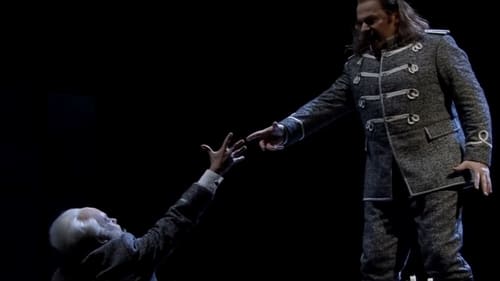
Shipman
Tsar Saltan marries the youngest of three sisters, having heard that it is her dearest wish to present him with a heroic son and heir. Her jealous sisters and the old Aunt Barbaricha cannot bear this situation to persist and by trickery see to it that the Tsaritsa and her newborn son Gvidon are thrown into the sea. In their barrel they are washed ashore on an enchanted island where the rapidly growing tsar’s son saves a swan from the clutches of a wizard. In gratitude, the swan helps Gvidon to visit his native country once again in the guise of a bumblebee. Three wishes, three miracles and three bee-stings later, father and son are finally able to get to know each other.

Chekalinsky
헤르만 장교는 ‘스페이드의 여왕’이라고 불리는 백작부인의 손녀 리자와 사랑하는 사이지만, 백작부인이 카드놀이에서 반드시 이기는 방법을 알고 있다는 이야기를 듣고는 그 비결을 알아내기 위해 백작부인에게 접근한다. 그 과정에서 부인이 갑작스런 충격으로 죽고, 리자는 배신감에 휩싸인다. 헤르만은 백작부인 유령으로부터 이길 수 있는 카드의 순서를 전수받고 도박장으로 달려가 처음 두 번은 성공하지만 마지막 게임에서 스페이드 퀸이 아닌 스페이드 에이스에 돈을 거는 바람에 모든 돈을 잃고 미쳐 버린다.

Astrologer
‘A beautiful song – a shame that it shows such disrespect to the Mayor!’ This remark from the score of The Golden Cockerel highlights the delicious ambiguity of this work. Principally inspired by Washington Irving and Pushkin, Rimsky-Korsakov called on the talents of Vladimir Belsky, an author of other libretti of a fairy-tale, legendary nature and an expert on Russian folk literature. The composer, a genius at orchestration, has given us sparkling music, with oriental touches, that creates fully rounded characters. This is the perfect occasion for Alain Altinoglu to direct his first opera in his new role as Music Director of La Monnaie. After the success of his Don Quichotte and Cendrillon, Laurent Pelly returns to La Monnaie to stage this exuberant political satire, an adventure in unrestrained rhythm. More than a century has passed since its first performance, yet the opera has lost none of its boisterous sarcasm.

Čerevin
Posthumously premiered in 1930, From the House of the Dead derives from Dostoevsky’s autobiographical 1862 novel that drew on his experience as a political prisoner in Siberia. Janáček focuses on Dostoevsky’s idea of the “spark of God” in every human being that has the potential to redeem even the most hardened criminal.



